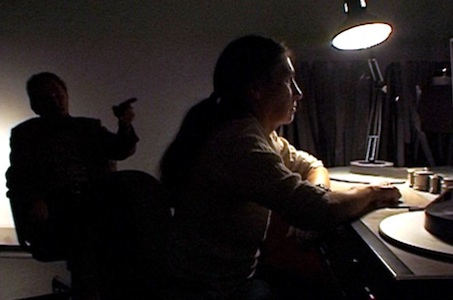Pedro Costa was paying a debt of influence and inspiration by making an episode of Cinéma de notre temps about Jean-Marie Straub and Danièle Huillet. “Godard seemed very old to me, suddenly, when I saw […] the films of Straub,” Costa is quoted as saying in a talk at CalArts in 2006. “They were the fastest, the furiousest, the most beautiful, sensual, ancient, modern.” Yet, in the same discussion, he stated that his film about them (the long version of Danièle Huillet, Jean-Marie Straub, Cinéastes is called Où gît votre sourire enfoui? or Where Does Your Hidden Smile Lie?) was anti-Straubian, the opposite from the way they would go about making films, yet very much about this very peculiar and uncompromising approach to film art.
1. Cut at the moment of tension, or relaxation.
While editing a scene of a Sicilian orange salesman in their film Sicilia, husband Straub advises editor/wife Huillet, “Cut while there is still tension, before he relaxes.”
“Shut up. I don’t have to cut my shot,” is her tense reply. “Be quiet! Shut up for ten minutes.”
Yet Costa lets this scene play out until Straub nervously sings different versions of a song, half in the editing room, and half outside in the hallway, gently easing the conflict and calming his wife, yet still subtly making an argument that he is, indeed, right. It is a very Costa transition, anti-Straubian and is a wonderful reflection on their opposing styles, as well as a great intro to the harsh screwball dynamic of this filmmaking couple.
2. Your heroes aren’t rich.
In describing a casting decision that they were unwilling to budge on in order to get funding, Straub says, “You pay the price. We haven’t any retirement insurance and that crap. But we’re happy….”
3. Sound soup is an easy fix.
In one scene, Huillet suggests that the sound of a train could help hold the scene together. Yet they both know this would be too easy a solution.
Straub goes on to describe sound soup: a song or sound that will hold the film together. He says there are many masterpieces, which they both love, that rely on sound soup; it’s not that it isn’t a legitimate choice. But it’s clear that it’s never a choice he could make. As he mocks, to say, “More music in there and everything would be nice and smooth!”
4. Anti-realist doesn’t mean anti-psychological.
Straub, in his gruff, comic voice, defends that just because there is no verisimilitude in their films, does not mean there is no psychology, “Just because it’s not like television, like Dallas and all that crap. Or even Woody Allen, or Cassavetes.” He describes that the psychology in their films as a subtle, dramatic abstraction that goes much deeper than performance. “It’s in the montage. It’s between the shots,” he says.
5. It’s hard not to talk bullshit.
“We’ve done enough stupid things. Why think of more stupid things we could have done?” says Huillet when she is sick of talking. “It’s hard not to talk bullshit,” she says later.
“Of course,” responds Straub. “That’s radical.” he goes on to describe how in film one is working so hard to create things that can’t be described, and that you destroy those things, and the film, when you talk about them.
And a bonus:
6. Repetition is more comic, and more moving, than surprise.
Straub at one point suggests that staying on one angle can be more surprising than any attempt the filmmaker could make to surprise. Similarly, though this argument-filled film seems an illustration of the hazards of a couple making movies together, the repetition of these arguments becomes, like screwball comedy, absolutely romantic.
“I’ve made quite a mess of your work, haven’t I?” says Straub to his wife.
“Happy now?” she says back.
“Now you’re going to sigh,” he says, knowing her and their daily interactions so well.




